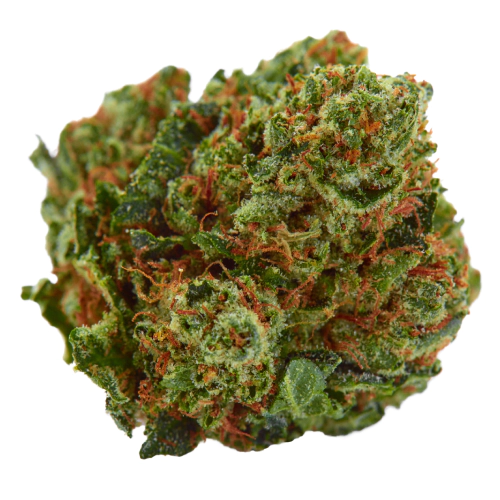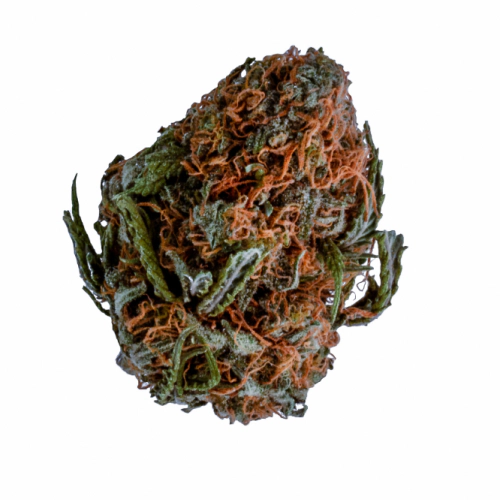THC 11 - 13%
CBD 0.14 - 1.05%
Effect Happy
Flavor Coffee
19.1 - 20.4%
0.42 - 0.77%
0.2 - 0.66%
Skunk, Woody
Sleepy
Frostbite strain is a Sativa-dominant cannabis plant. There are several theories about its origin, but most believe it is a mix of Deep Purple by TGA Subcool with Afghan Kush. Consumers love this marijuana for its powerful effects and their duration.
This cannabis has a high THC content of 18%, making it an excellent pastime mostly for experienced smokers, usually in the evening or before bed. Medical users prefer this strain for the treatment of symptoms of various diseases, including:
Frostbite will also appeal to those looking for a strong buzz. It immerses in euphoria and absolute physical and mental relaxation, calms nerves, and helps to focus. Some smokers prefer to take a couple of extra puffs to fall asleep quickly after a busy day.
Side effects include dry mouth and eyes, headaches, and dizziness.
This cannabis will amaze lovers of really tasty-smelling varieties. Its aroma is striking with a mixture of sweet fruity notes with spices. However, Frostbite tastes quite controversial with mainly sour and earthy with woody notes. Some smokers report skunky notes.
Frostbite plants have a low level of difficulty to grow and produce high yields indoors, but can also grow outdoors. The flowering time is about 62-79 days. The purple flowers are densely dotted with trichomes, which give them the effect of frozen leaves. Frostbite seeds are available in online stores.
| THC | Tetrahydrocannabinol, or THC, is a major cannabis chemical compound. It is a psychoactive element that stimulates dopamine release and induces euphoria or happiness. THC-rich strains may be helpful with such conditions as lack of appetite, chronic pains , etc. It is considered to be the primary active marijuana component. | 19.1 - 20.4% |
| CBD | Cannabidiol, or CBD, is a major compound in cannabis, which is non-psychoactive. It is also proved to counteract the side effects of the second major component THC. CBD is widely used for medicinal purposes in rubs, oils and so on. It is helpful in muscle pain cases, may treat arthritis and migraines. Even Greeks used it against pain, while Queen Victoria applied it to get rid of menstrual cramps. | 0.42 - 0.77% |
| CBC | Cannabichromene, or CBC, is a minor cannabinoid, meaning that its quantity in cannabis is quite little. Though it has the same origin as CBD and THC, it is different in functions. Without any psychoactive effects, it is an efficient cannabis compound in combating acne and depression. CBC produces analgesic, antibacterial and anti-inflammatory effects. | 0.35 - 0.46% |
| CBG | Cannabigerol, or CBG, is one of the minor cannabis compounds in adult plants. On the other hand, young ones contain a lot of this antibacterial and anti-inflammatory component. During the growth, CBG is converted into different cannabinoids, mostly THC and CBD. The compound itself increases appetite and decreases eye pressure. | 0.2 - 0.66% |
| CBN | Cannabinol, or CBN, is a trace element in cannabis that is considered to be mildly psychoactive. It appears from oxidation THC, exposed to light and heat. CBN is mostly contained in old cannabis and in traditional hashish. It is effective against insomnia, bacterial infections and appetite loss. | 0.34 - 0.38% |
| THCV | Tetrahydrocannabivarin, or THC-V, is a compound contained in cannabis in trace amounts. Even though it is close to THC molecularly, it is different in effects. This compound may be psychoactive only in large amounts. THC-V reduces blood sugar, controls appetite, stimulates bone growth, etc. African Sativa strains are the richest in THC-V. | 0.25 - 0.63% |
| Pinene | Pinene is one of the most widespread terpenes in nature, found in pine trees, basil, nutmeg, parsley, and rosemary. Cannabis containing terpene (alpha-pinene or α-pinene) boasts a strong pine scent. Pinene is responsible for anti-inflammatory, pain-relieving, and anti-anxiety effects. | 0.09% |
| Myrcene | Myrcene (also known as β-myrcene) is one of the most common terpenes found in cannabis, representing more than 20% of the modern marijuana terpene profile. Myrcene has a distinct earthy, musky flavor, resembling cloves. It is responsible for calming and soothing effects of weed. Myrcene is also found in hops, thyme, mango, lemongrass, guava melon. | 0.18% |
| Ocimene | Ocimene (derived from the Ancient Greek word Ocimum meaning basil) is a terpene with sweet and herbaceous flavors, also boasting citrusy and woody undertones. Naturally, ocimene occurs in mint, parsley, orchids, hops, kumquats, mangoes, basil, bergamot, lavender, and pepper. Offers antifungal, anti-inflammatory, and antiviral properties. | 0.01% |
| Humulene | Humulene (also known as α-humulene) is one of the major terpenes found in cannabis, contributing to woody, earthy, spicy, herbaceous, and, mainly, floral aromas of cannabis. Used in modern medicine, humulene offers anti-inflammatory, antibacterial, and appetite suppressant effects, which have been well-researched by pharmaceutical companies. | 0.16% |
| Limonene | Limonene (also known as d-limonene) is the second most common terpene in nature and the third most common terpene in cannabis. It has a powerful citrus aroma and can be found in all citruses, including lemons, oranges, grapefruits, limes, juniper, etc. Limonene is known to elevate moods and provide anxiety, depression, and stress relief. | 0.12% |
| Linalool | Linalool (also known as beta linalool, linalyl alcohol, linaloyl oxide, and p-linalool) is one of the rarest terpenes found in cannabis, mostly in small quantities. Linalool is known for its spicy and lavender aroma, bringing relaxation and calming effects. It is also said to provide anti-inflammatory and analgesic properties that can be useful for athletes. | 0.04% |
| Bisabolol | Bisabolol (also known as α-Bisabolol or levomenol) is a lesser-known terpene found in cannabis. It contributes to anti-inflammatory, anti-irritant, antioxidant, anti-microbial, and analgesic properties of weed strains containing bisanol. Attentive smokers would be able to catch a nutty, fruity scent with herbal and floral undertones, with a tender trace of coconut. | 0.11% |
| Valencene | Valencene is a terpene that got its name from Valencia oranges - a fruit where It's initially found. Valencene offers citrusy, sweet aromas, with flavors having notes of oranges, grapefruits, tangerines, and, occasionally, fresh herbs or freshly cut wood. Citrus aromas, frequently found in a wide variety of cannabis strains, are contributed to by valencene, which is known for anti-inflammatory and insect repelling properties. | 0.18% |
| Terpinolene | Terpinolene is one of the most common terpenes found in cannabis; however, It's usually presented in small quantities. Is responsible for piney, floral, herbaceous, and even a little bit citrusy aroma of cannabis. Terpinolene can be found in lilacs, nutmeg, and cumin. In cannabis, terpinolene contributes to the sensation of "freshness." Has the potential to reduce the risk of heart diseases. | 0.02% |
| Caryophyllene | Caryophyllene (also known as beta or b caryophyllene) is a terpene found in many herbs and spices, such as black pepper, basil, rosemary, and oregano. Cannabis high in caryophyllene delivers a strong spicy, peppery aroma, resembling cinnamon and cloves. Caryophyllene offers potent anti-inflammatory and sedative effects. | 0.1% |
| Total terpenes content | 1.01% |
THC 11 - 13%
CBD 0.14 - 1.05%
Effect Happy
Flavor Coffee
THC 16 - 17.75%
CBD 0.45 - 0.92%
Effect Relaxed
Flavor Sweet
THC 22 - 23%
CBD 0.66 - 0.87%
Effect Energetic
Flavor Grapefruit

THC 21.75 - 24.25%
CBD 0.52 - 0.88%
Effect Sleepy
Flavor Spicyherbal
THC 17.75 - 19.5%
CBD 0.53 - 0.86%
Effect Relaxed
Flavor Grape

THC 17.33 - 19.67%
CBD 0.56 - 0.87%
Effect Relaxed
Flavor Skunk
THC 22.67 - 25%
CBD 0.34 - 0.71%
Effect Uplifted
Flavor Sweet
THC 19 - 22.5%
CBD 0.16 - 0.95%
Effect Sleepy
Flavor Lime
THC 14.33 - 16.67%
CBD 0.65 - 0.47%
Effect Creative
Flavor Spicyherbal
THC 19.8 - 21.2%
CBD 0.35 - 0.81%
Effect Tingly
Flavor Citrus
THC 15.5 - 22.5%
CBD 8 - 15%
Effect Uplifted
Flavor Plum
THC 22 - 25.5%
CBD 0.42 - 0.62%
Effect Tingly
Flavor Sweet
Be the first and share your opinion
Write a Review